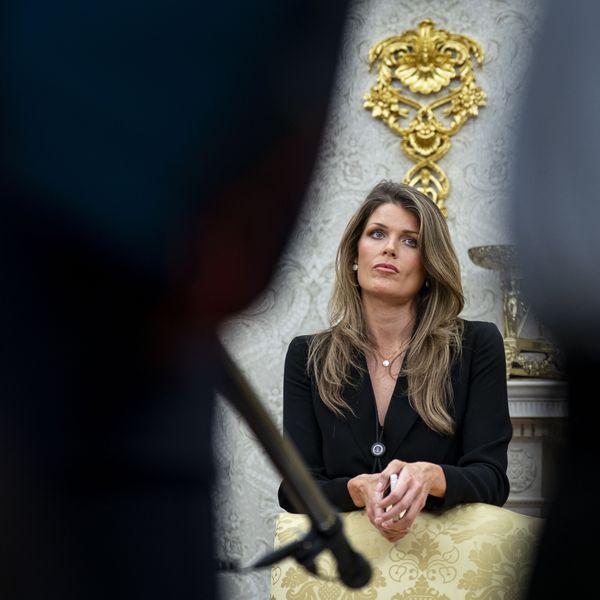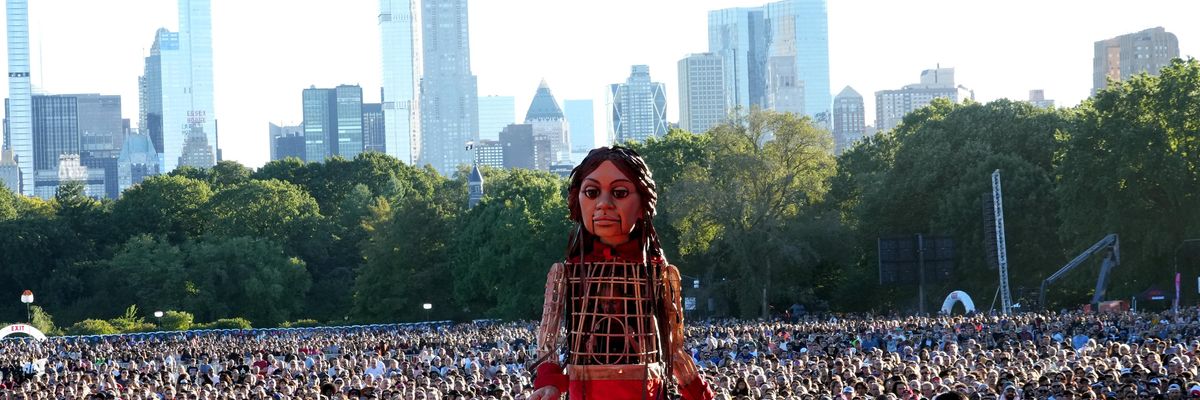I was completely taken in by her as she gently tried to turn the great cube at Astor Place on her way to Washington Square park. Surrounded by many others, she had all of us mesmerized by her big eyes, expressive gestures, bending toward and, somehow, embracing each person. She does this with a grace that is impossible to articulate. One forgets that she is a puppet.
"When we talk about migration and refugees, we tend to forget that more than half the people we're talking about are children."
Although she is 12 feet high, she is called "Little Amal." Amal means hope in Arabic. Only 10 years old, Little Amal is from the Aleppo area of Syria, an area I am somewhat familiar with having stayed there on more than one occasion with refugee families who fled Iraq.
Aleppo was brutally hit during the conflict in Syria. By 2012, the city had become one of the main battlegrounds for the civil war. Somehow Little Amal was separated from her family in a refugee camp. For the last year and a half she has been on a journey, traveling around the world searching for her family. Now she was on a 17 day trip through the five boroughs as part of a theater project to raise awareness about refugee children. "When we talk about migration and refugees, we tend to forget that more than half the people we're talking about are children," said the artistic director of Little Amal Walks NYC, Amir Nizar Zunabi.
Little Amal must have known that I needed hope. Two members of my Catholic Worker community must have sensed this as well, as they urged me to go out and see her as she was walking right through our neighborhood one evening.
I can't get her image out of my mind. I have been flooded with past memories. One is of a young 14 year old boy, Mohammed, whose father and physical therapist brought him to me on a trip to Iraq in 2013. This boy will forever be engraved in my mind and heart. He was 6 years old and returning home from school when he stepped on an electrical wire downed by a US bomb. He lost both arms and legs. Can you help him get a prosthetic arm his father asked?
This boy no longer speaks. He cannot hug anyone, scratch or feed himself. I showed his picture when giving talks in the states. I tried in Jordan and through agencies to get help for him. I still think of him.
I am a cause and relationship person. Mohammed has no arms and legs because of war, because of what we did to his country. We have no country dropping bombs on us, maiming us, causing us to flee our homes, livelihoods and country. Our war is much more insidious. We are exploding from within, and have been for many years. Mass shootings in schools, supermarkets, places of worship, teen suicides, veterans suicides, suicides by opiates, blatant racial killings, on and on the list goes.
Weapons is our biggest industry. So many years of waging war on innocent people. So many years of killing, maiming and creating refugees, and then we deny them entrance. Iraq and Afghanistan bear tragic witness to this.
Amal doesn't speak with words either. But she says volumes. She wasn't able to turn the cube at Astor Place, but perhaps she can soften our hearts to welcome the stranger.



